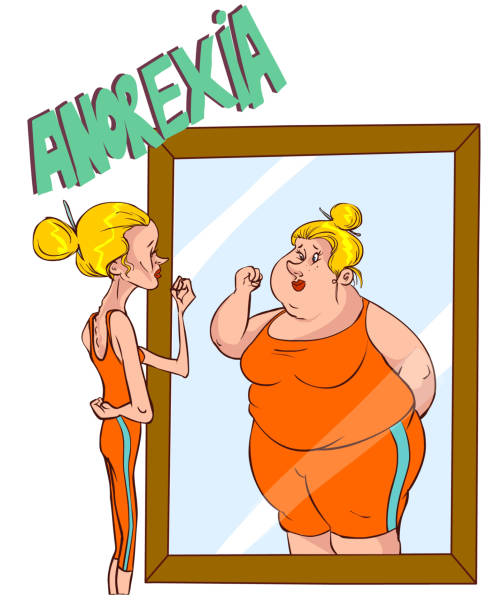
Vector illustration of a Anorexia - Distorted Body Image
What is Anorexia Nervosa?
Anorexia nervosa is a psychological condition that has a negative impact on the body, the mind, and society. Body dissatisfaction and an obsession with the fear of putting on weight are its defining traits.
Many people are concerned about putting on too much weight. Anorexia nervosa is a condition that occurs when worry becomes obsessive in some people. An eating disorder called anorexia nervosa can cause extreme weight loss. Anorexics are concerned with their weight and caloric intake.
People who have anorexia nervosa consume extremely few calories and are overly afraid of putting on weight. When they lose weight, they frequently feel better about themselves. They might also overdo their exercise. Anorexia is most frequently diagnosed in teenage girls, but it can also affect patients who are older, younger, or male.
Signs and symptoms of anorexia nervosa
The disorder of anorexia nervosa is complicated. Even after experiencing significant weight loss, a person with extremely unusual anorexia nervosa may still be of average weight.
Other physical symptoms and signs associated with nutrient deficiency include:
- Severe muscle loss
- Hopelessness, tiredness, or exhaustion
- Low blood pressure
- Feeling faint or physically sick
- Low body temperature, cold hands and feet, or possibly hypothermia
- Bloated or upset stomach dry skin
- Swollen hands and feet
- Hair loss a lack of menstrual periods or less frequent periods
- Infertility/insomnia
- Loss of bone density, which raises the possibility of fractures
- Brittle nails
- Constipation
- Irregular or abnormal heartbeats
- Lanugo, which is acceptable People who frequently vomit have more facial hair, bad breath, and tooth decay, as well as downy hair on their bodies.
The individual may additionally exhibit certain behaviours, such as:
- Reducing their total calories consumed or the variety of foods they eat
- Exhibiting an excessive concern for food, calories, body size, dieting, and weight
- Exercise frequently, use pills, or induce vomiting
- Frequently evaluating their size and weight
- Referring to oneself as “fat” or overweight
- Establishing eating rituals, such as eating certain foods in a certain order
- Cooking without eating for others
- Avoiding social interaction and friends
- Displaying symptoms of depression
The individual might link eating and eating with guilt. They might act as though nothing is wrong or refuse to admit they have eating-related problems. Not every person with the disorder exhibits the same behaviours, and some people may have atypical anorexia nervosa, which means that they do not have a low body weight.
Causes of anorexia nervosa
Anorexia’s exact origin is unknown. It’s likely a result of a combination of biological, psychological, and environmental factors, as is the case with many diseases.
Biological – Although the genes that are involved are still unknown, some people may be more susceptible to developing anorexia due to genetic changes.
Psychological – Some anorexics may exhibit obsessive-compulsive personality traits that make it simpler for them to maintain stringent diets and refrain from eating even when they are ravenous. They may have a strong desire for perfection and believe they are never thin enough as a result. Additionally, they might experience high levels of anxiety and practice restrictive eating to lessen it.
Environment – Anorexia nervosa development may also be influenced by social pressure to appear thin. Unrealistic body images in media like magazines and television can have a significant impact on how young people view their bodies and their desire to be thin.
Natural Treatments for Anorexia Nervosa
Anorexia Nervosa is typically handled by a multidisciplinary team of medical professionals. Along with a general practitioner, this might require the services of a dietitian, clinical psychologist, psychologist, counselor, or specialist.
Investigation is required to determine the most effective course of treatment for anorexia nervosa. Nobody’s particular therapeutic strategy will be effective for them all. With medical assistance, the majority of patients will beat their illness.
Psychotherapy
- Family-based treatment (FBT) in psychological therapy has been found to be the most successful form of care for children and adolescents. In order to defeat an eating disorder and assist someone in regaining control of their life, FBT calls for the cooperation of the entire family.
- The goal of cognitive behaviour therapy (CBT) is to change the unhelpful thoughts and behaviours that are causing the eating disorder. Adult CBT has received the most research and recommendation. To help the patient understand the links between their thoughts, emotional responses, and eating behaviour, a medical team will work with them.
- Cognitive Analytic Therapy (CAT): Cognitive analytic therapy focuses on old, problematic thought and behaviour patterns. In order to break bad habits, the therapy entails reformulating the events, acknowledging their effect on the condition, and developing solutions.
- Interpersonal Therapy (IPT): In interpersonal therapy, problematic worries and concerns about interpersonal relationships are examined, along with potential solutions.
- Dietary control – The return to a healthy weight is the first step in the treatment of anorexia nervosa. This helps treat the condition and help the body regain its strength. Patients frequently work with a nutritionist or dietician to establish their ideal weight goals and develop a diet plan. Exact diet plans and energy requirements are required in order to reach a healthy body weight.
It’s critical to address any negative eating habits patients have, such as compulsive vomiting after binge eating, that prevent them from eating normally.
If you’re experiencing any of the mentioned challenges or believe you might have an eating disorder, look for help from the (TalktoAngel) best platform. If you’re trying to conceal your anorexia from close friends and family, try to find someone you can confide in. Help your loved one get in touch with a psychologist.
Visit TalktoAngel to speak with some of the best online mental health professionals. You can find the greatest “Best psychologist in India” or “Online counselling” regardless of your search criteria.






